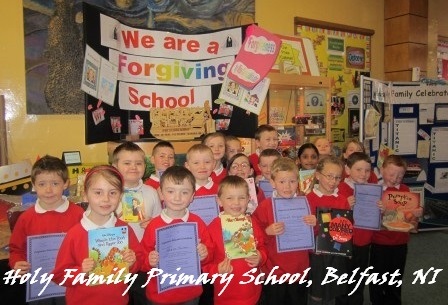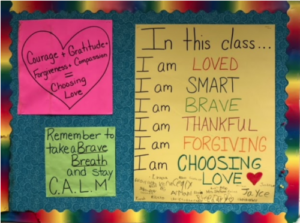Our Forgiveness Blog
10 Years of Forgiveness Education in Northern Ireland
 The Forgiveness Education Programme is celebrating its 10-Year Anniversary of working with children, schools and communities in Northern Ireland to make the virtue of forgiveness more understandable and accessible.
The Forgiveness Education Programme is celebrating its 10-Year Anniversary of working with children, schools and communities in Northern Ireland to make the virtue of forgiveness more understandable and accessible.
“Forgiveness is an important aspect in the emotional and moral development of any individual,” states Gary Trainor, Vice Principal at Mercy Primary School, “and if we can sow those seeds at an early age, we are increasing the chances of them bearing fruit throughout their lives.” It was with this long term goal in mind that the Forgiveness Education Programme first began to take shape..
In 2002, Dr. Robert Enright, Educational Psychologist at the University of Wisconsin – Madison, USA began to establish relationships with a couple of principals and schools in North Belfast. With the help of Anne Gallagher of Seeds of Hope, Dr. Enright was able to introduce Forgiveness Education to the first classroom of Primary 3 pupils in Ligoniel Primary School.
Ten years on, Claire Hillman, Principal at Ligoniel PS says, “At the time we started we had very few personal development resources in the primary school and no coherent programme of work. The Forgiveness (Education) Programme helped us to formulate a whole school approach to building personal qualities such as empathy, respect and trust. The programme now sits alongside the PDMU (Personal Development for Mutual Understanding) programme of work developed by the curriculum council. The work of Professor Enright has helped us develop the life skills of hundreds of children in North Belfast and is continuing to impact on their lives.”
This same perspective is echoed by Mr. Trainor from Mercy PS who says, “During our daily interactions with our pupils, as teachers we are always promoting the positive attributes and virtues we wish those in our care to portray. The Forgiveness (Education) Programme consolidated our aspirations for kindness, generosity, sharing and understanding. It gave us an extra tool to enhance our pupils’ experiences through story, discussion, art and role play. The children’s ability to communicate their feelings also improved, they began to develop a vocabulary that was both respectful of others and of themselves.” Mercy Primary School first began teaching Forgiveness Education in 2005.
Over the years, the Forgiveness Education Programme has developed and grown from that first Primary 3 classroom. Overseen locally by Padraig O’Tuama and then Becki Fulmer, in cooperation with Youth with a Mission, Peacelines, and now The Corrymeela Community since 2009, the programme has grown throughout the years from one classroom in one school to the curriculum being taught in over 100 classrooms in 20 schools across Northern Ireland.
One school in particular who has been involved with Forgiveness Education since 2004 is Holy Family Primary School. Dinah McManus, Principal, always refers to Holy Family as a “Forgiving School” because they have imbedded the virtue of forgiveness in to their school ethos. Mrs. McManus states, “I can say with confidence and some pride that in creating a “forgiveness ethos” in Holy Family we have provided our children with a very nurturing environment which reflects the essential elements of our Mission Statement: We are a living Faith community, centred on the Gospel values of love, justice and forgiveness, within which each member of our school community is valued and respected.”
Mrs. McManus states, “I can say with confidence and some pride that in creating a “forgiveness ethos” in Holy Family we have provided our children with a very nurturing environment which reflects the essential elements of our Mission Statement: We are a living Faith community, centred on the Gospel values of love, justice and forgiveness, within which each member of our school community is valued and respected.”
She goes on to say, “As the Forgiveness Education Programme has developed in Holy Family we, as teachers, have explored the messages within the programme and have come to appreciate their value to us in our efforts to create a strong, cohesive team. We acknowledge that we are all human and, as such, flawed. We now take time, for example on our ethos day, to remind ourselves of the power of forgiveness. To forgive another does not mean to forget what happened or to negate the other person’s responsibility for their actions. It simply means that we no longer allow another’s actions or words to cause us anger or resentment. By understanding the other person’s humanity, by forgiving without expecting anything in return, we are the ones who are healed. There is no doubt that we are, as a result, much more understanding of each other’s foibles and less inclined to find fault or to take offence at others’ comments or actions.”
The Forgiveness Education Programme has spent the past ten years dedicated to helping children, schools and communities develop a better understanding of what it means to value all people, to understand our own and others humanity and to practice respect, kindness, generosity and forgiveness. We look forward to what the next ten years have to offer.
If you are in the Republic of Ireland or anywhere else in the world and would like to bring Forgiveness Education to your school, please contact the Director of our International Forgiveness Institute at director@internationalforgiveness.com.
Becki Fulmer, Director
Northern Ireland Forgiveness Education Program
But, the Dictionary Says….
So often I have heard people fall back to a definition of something with deep philosophical import by saying, “But, the dictionary says….”
Let us examine the definition of “forgive” from the Merriam-Webster on-line dictionary. The first entry tells us that “forgive” means “to give up resentment…” As we saw in our blog post of December 19, 2012, this cannot possibly be the definition because it also could define the term indifference. If I give up resentment yet retain some mild annoyance toward those who have offended me, then I still actually may not be forgiving.
A synonym allegedly is pardon. Yet, pardon, as a legal term, involves a third party, uninvolved in the original offense, making a determination. In forgiveness the one offended is making that determination.
Bottom line: When it comes to philosophically subtle and important terms such as forgiveness, it is best not to rely on the dictionary.
And as a final thought, the writers at Merriam-Webster would do well to revise their dictionary.
Dr. Bob
Seeing with New Eyes
The late Lewis Smedes used this expression: to see with new eyes. He meant this: When we forgive we no longer see in the same way those who have hurt us. We see them from a wider perspective than just their offenses against us. We see them as worthwhile people, not because of what they did, but in spite of this.
So, in this tradition of Dr. Smedes, let us do a little homework today. As you interact with or even pass by five different people, please think these thoughts about him or her:
1. This person has inherent, or built-in, worth that cannot be taken away from him/her.
2. This person is special, unique, and irreplaceable. When this person is no longer living, there will not be another person exactly like him/her.
3. In all likelihood, this person is carrying around emotional wounds received because of other’s mistreatment of him/her.
Then, once this thinking exercise is complete, try to apply the statements to one person who has been unfair to you, who has hurt you. Try to “see with new eyes” as you reflect on this person.
Dr. Bob
Inspired by Forgiveness
Belfast Telegraph, Belfast, Northern Ireland – The Archbishop of Canterbury, Dr. Rowan Williams, delivered his final Christmas Day sermon from Canterbury Cathedral (Canterbury, Kent, UK) and spoke of how he has been inspired by meeting people who have experienced great suffering yet are able to forgive. “The parents who have lost a child to gang violence, the wife who has seen her husband killed in front of her by an anti-Christian mob in India, the woman who has struggled for years to comprehend and accept the rape and murder of her sister, the Israeli and Palestinian friends who have been brought together by the fact that they have lost family members in the conflict and injustice that still racks the Holy Land – all these are specific people I have had the privilege of meeting as Archbishop over these ten years,” Dr. Williams said, “and in their willingness to explore the new humanity of forgiveness and rebuilding relations, without for a moment making light of their own or other people’s nightmare suffering, or trying to explain it away, these are the ones who make us see, who oblige us to turn aside and look, as if at a bush burning but not consumed.”
Dr. Williams steps down at the end of the month after a decade as head of the Church of England to become Master of Magdalene College, Cambridge, UK, and chairman of the board of trustees of Christian Aid, an international development charity.
Read the full story: “Williams inspired by forgiveness.”
Your Unfolding Love Story Continued
On January 19, 2012 we posted a reflection on our blog site in which we encouraged readers to grow in love as their legacy of 2012. We said this:
“Give love away as your legacy of 2012.
How can you start? I recommend starting by looking backward at one incident of 2011. Please think of one incident with one person in which you were loved unconditionally, perhaps even surprised by a partner or a parent or a caring colleague. Think of your reaction when you felt love coming from the other and you felt love in your heart and the other saw it in your eyes. What was said? How were you affirmed for whom you are, not necessarily for something you did? What was the other’s heart like, and yours?”
Our current year, 2012, is about to end. Can you list some specific, concrete ways in which you have chosen love over indifference? Love over annoyance? If so, what are those specifics and how are they loving? We ask because we have only about a week-and-a-half left in the year.
If you have not yet deliberately left love (or enough love) in the world this year, there still is time.
Dr. Bob



